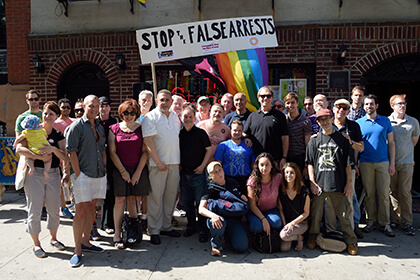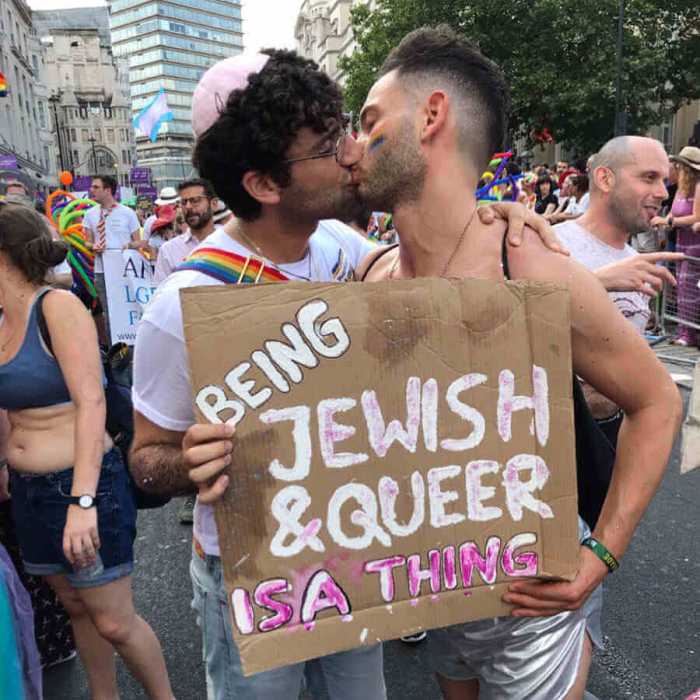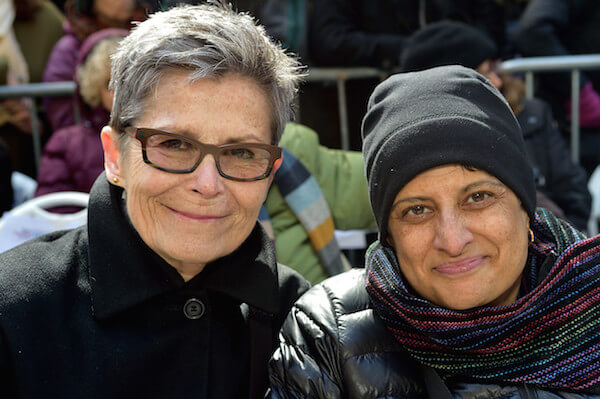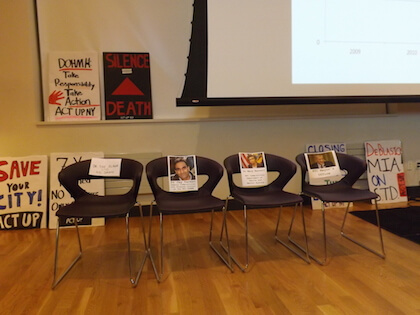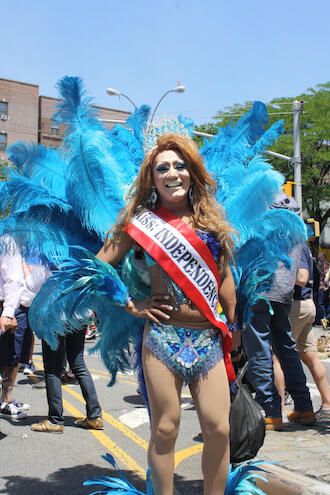Robert Pinter with the Anti-Violence Project’s Sharon Stapel. | DONNA ACETO
The emotion was evident in Robert Pinter’s voice as he stood outside the Stonewall Inn on Christopher Street and read an email from a man who, like Pinter, was falsely arrested on prostitution charges by cops from the Manhattan South Vice Enforcement Squad.
“Good… congrats from my part… glad you stood up,” the man wrote in broken English of the recent $450,000 settlement Pinter reached with the city regarding his 2008 arrest. “Myself no brave enough to go like you… but you victory is our victory in such many ways… I hope that we don’t have to go through this ever again.”
Pinter, 58, was one of 41 men known to have been arrested for prostitution in six Manhattan porn shops in 2008 and early 2009. The city cited those arrests, which were widely seen as false arrests, in nuisance abatement lawsuits brought against the shops in an effort to close them. Soon after he exposed the arrests in late 2008, Pinter began a six-year campaign in conjunction with other groups to reform police practices.
And he sued in federal court.
Crowd gathers at Stonewall Inn to celebrate victory over NYPD’s false arrests of gay men
“What began as a horrendous experience and embarrassing experience has enriched my life beyond measure,” he said at the June 21 event that marked the end of this effort.
His initial work was with a group of longtime community members who brought various grievances to the effort. Among the members were Joel Czarlinsky, who once owned the Houston Street sex club El Mirage that was shuttered by the city in 2006 and remained angry over that closure, William Dobbs, who has long been a defender of free expression, including sexual freedom, and Chris Farrell, a longtime member of the North American Man/ Boy Love Association, who wanted to see the vice squad ended.
In 2009, Pinter was clearly unhappy with the diverse interests and Farrell’s participation in particular. The group quickly imploded.
“I think it was a difference in strategizing, a difference in focus,” Pinter said at the Stonewall event. “I wanted to keep it tightly focused on this issue.”
Pinter, who launched the Campaign to Stop the False Arrests, eventually found peers in the Police Reform Organizing Project (PROP), a program at the Urban Justice Center that opposes stop and frisk, among other police practices. Pinter began organizing LGBT people to support PROP’s work. His effort to forge a coalition gained momentum in 2012 when he joined national civil rights groups, such as the NAACP, major unions, and local and national LGBT groups in endorsing the End Stop and Frisk Silent March Against Racial Profiling. A press conference announcing the unified embraced of that march was also held at the Stonewall Inn.
A crowd of supporters stand with Robert Pinter at the Stonewall Inn on June 21. | DONNA ACETO
During his political organizing, Pinter was also contending with the federal lawsuit that saw favorable rulings from District Judge Shira Scheindlin as well as setbacks, as the Second Circuit Court of Appeals reduced the scope of his complaint and the number of defendants. The Bloomberg administration, which was always more interested in appearing to be pro-police, designated his case “no pay” and refused to settle.
In 2013, the case was set to go to trial. Of the six lawsuits filed over the arrests, Pinter had the least favorable facts. In Blue Door Video, the East Village porn shop where he was arrested, the obvious pattern was that police sent young undercover cops in to solicit consensual sex from older men. When men agreed to the sex, the undercover cops said they would pay for the sex and the men were arrested. Pinter never said yes or no to the offer of cash. He initially pleaded guilty to a violation and received an adjournment in contemplation of dismissal. His guilty plea was later vacated, with the support of the Manhattan District Attorney’s Office.
Police targeted African-American and Latino men in the other five shops. The four men who were arrested in those shops and later sued explicitly rejected the money and never pleaded guilty. Their cases were dismissed. The sixth lawsuit stemming from an arrest in a spa is ongoing.
Ultimately, it was a new administration under Mayor Bill de Blasio that made a settlement possible.
“I’m happy that Robert won, but it was earned really hard,” said Andy Velez, a longtime gay and AIDS activist, at the June 21 event. “There is no money that can pay for that harm.”
Pinter gets $50,000 in the settlement and his two attorneys split the remaining $400,000. The amount for Pinter is in line with earlier settlements that saw one man get $25,001 and the other three get $45,001.
A few men who were also arrested reached out to Pinter, but he was alone in going public. The email Pinter read came from a man he called José, a pseudonym, was unsigned, and the man never gave his name or agreed to meet Pinter.
“That kind of courage is so wonderful and a great example,” Sharon Stapel, the executive director at the New York City Anti-Violence Project, said of Pinter. “We can learn from Robert’s example and his courage.”

